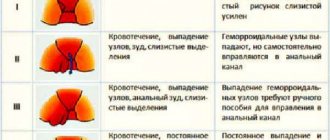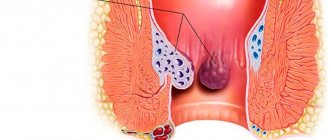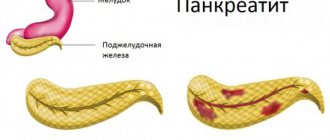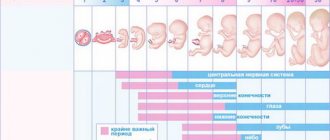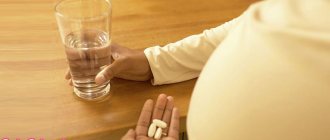Causes of hemorrhoids in pregnant women
The disease can develop at any stage of pregnancy. Provoking factors may include :
- hormonal shift - a high concentration of progesterone provokes relaxation of the vascular wall and smooth muscles;
- increased intra-abdominal pressure - the increasing volume of the uterus provokes compression of blood vessels and the lower intestine, slowing down peristalsis and blood flow;
- constipation - unbalanced nutrition, increased body weight and physical inactivity lead to slow evacuation of intestinal contents.
Any of these reasons can contribute to the development of hemorrhoids . Most often, the onset of the disease occurs at 20-24 weeks of pregnancy.
How to prevent the development of hemorrhoids in pregnant women?
The following tips will help reduce the possible risk of developing hemorrhoids during gestation:
- exclude hot seasonings and spices, marinades, fried and fatty foods from your diet, and also limit the consumption of salt and baked goods;
- Eat raw vegetables, fruits, dried fruits, herbs and grains daily;
- drink enough clean water - at least six glasses;
- Perform daily exercises that help strengthen the muscles of the pelvic floor and anus;
- increase physical activity if your condition allows. Swimming, water aerobics and walks in the fresh air will help with this;
- replace the use of toilet paper with flushing with water;
- during long-term sedentary work, do motor warm-up every 2 hours;
Despite the fact that some suppositories can be used during pregnancy, the use of any medication during this period is undesirable. Therefore, you need to take care of your health in advance by following the recommendations described above.
It is also important to understand that self-medication in this case is unacceptable, since illiterate selection of an antihemorrhoidal drug can lead to miscarriage, premature birth or congenital pathology in the unborn child. Therefore, at the first signs of hemorrhoids, immediately contact a competent specialist - a proctologist, who will prescribe an effective and safest treatment regimen.
Types of disease
Hemorrhoids can appear in women when carrying a child and differ in the location of the nodes :
- external - characterized by inflammation of external hemorrhoids, accompanied by severe pain, bleeding, itching in the rectum;
- internal - characterized by mild symptoms and discomfort that manifests itself during bowel movements.
According to the clinical course, the pathological process is classified into the following forms :
- acute – characterized by a rapid increase in symptoms in the form of pain, itching, burning in the anal area. This form of hemorrhoids most often develops in the second trimester of pregnancy;
- chronic – characterized by an undulating course with periods of remission and exacerbation.
Diagnosed hemorrhoids in pregnant women are subject to mandatory treatment , since childbirth can aggravate the course of the pathological process.
Important! The appearance of discomfort, itching and burning in the rectal area are indications for examination by a specialist to diagnose hemorrhoids and prescribe treatment.
Suppositories for hemorrhoids during pregnancy: how to treat them
For pregnant women, the pharmacy offers a large selection of local remedies. Special suppositories significantly alleviate the condition: improve vascular tone, eliminate pain, and restore blood flow. The drugs are considered effective and at the same time have no effect on the baby.
It is important to respond to pathological changes in a timely manner. Bleeding can cause iron deficiency anemia in a pregnant woman, which has a negative impact on the condition of the fetus.
What suppositories should be used to treat hemorrhoids during pregnancy:
- "Natalsid" is a plant-based product. In production, polysaccharide from brown algae is used. Sodium alginate reduces inflammation. The drug swells in the rectum, softening stool and facilitating bowel movements. Natalsid is allowed for any period of time. The only contraindication applies to allergy sufferers.
- "Relief Advance" . Benzocaine, which is included in the composition, relieves pain due to its anesthetic properties. Cocoa butter has a softening effect. Squalene - a derivative of shark liver - has a wound-healing and anti-inflammatory effect. They have a similar contraindication.
- “Posterizan” produces a pronounced immunostimulating effect. Properties: anti-inflammatory activity, acceleration of healing, indirect analgesic effect, prevents secondary infection. Use under medical supervision.
- "Neo-Anuzol" is a combination drug. It has a local analgesic effect, has anti-inflammatory, astringent, and antiseptic properties.
- "Hepatrombin G" . Suppositories have antipruritic, local anesthetic, antispasmodic, anti-inflammatory, antithrombotic, and hemostatic effects. The drug is contraindicated in the 1st trimester.
- Sea buckthorn suppositories for hemorrhoids during pregnancy stimulate repair processes. They melt easily, envelop problem areas, and bring relief due to their oily base.
- Papaverine suppositories are a universal remedy. Reduces pressure on the intestinal walls, is an antiseptic and anesthetic.
- Methyluracil suppositories produce an anti-inflammatory effect, accelerate healing, and stimulate metabolic processes. Promotes activation of immune defense. Used under medical supervision.
- Suppositories with glycerin - provide healing of microtraumas, and also soften stool, facilitating its elimination. Not recommended in the first trimester and if there is a threat of miscarriage.
- Suppositories with ichthyol have an excellent anesthetic effect and disinfecting properties. Before use, you should consult your doctor. There are contraindications.
Suppositories for hemorrhoids in pregnant women
Advantages of suppositories: uniform coating of the mucous membrane, rapid absorption, no violation of the integrity of the skin, no harmful effects on the liver and gastrointestinal tract.
It is recommended to use suppositories after bowel movements. It is better to do the procedure at night, leaving the drug to act until the morning. In the morning after administration, you need to lie down for 30 minutes.
What suppositories are allowed?
For pregnant women, not all suppositories can be used in the treatment of hemorrhoids . The period of gestation in the treatment of the disease is also important. The early period of pregnancy, when the organs of the future baby are being laid, is the most sensitive to negative factors that influence a woman.
For each period, there is a specific list of suppositories approved for use by pregnant women, which give good results in the treatment of hemorrhoids.
In the first trimester
This period is important not only for the formation of the unborn child, but also for the danger of spontaneous miscarriage , which can be caused by various reasons. In this case, suppositories containing ingredients that can increase smooth muscle tone are excluded. What can be used for hemorrhoids during pregnancy during this period?
Suppositories that actively relieve clinical symptoms are the safest for women and fetuses :
- "Methyluracil". The active substance is methyluracil. It is a tissue stimulator that improves trophism and tissue regeneration. Package price (10 pieces) – from 80 to 120 rubles;
- "Neo-Anuzol". Contains a number of ingredients (zinc oxide, bismuth nitrate, tannin, iodine, resorcinol, methylene blue) that have an analgesic, antiseptic, and anti-inflammatory effect on the site of pathology. Packaging price – 60-70 rubles;
- "Natalsid." The active ingredient is sodium alginate. It is of natural origin and is obtained from seaweed. Suppositories have an anti-inflammatory, hemostatic and regenerating effect. The cost of packaging (10 pieces) is from 350 to 450 rubles;
- sea buckthorn candles. Contains concentrated sea buckthorn oil. They have anti-inflammatory, regenerating, hemostatic effects. The price of 10 candles is from 90 to 130 rubles;
- "Ichthyol." The active substance is ichthyol, gives an anti-inflammatory, regenerating, antiseptic effect. The cost of packaging is from 55 to 80 rubles.
In the second
In the second trimester of pregnancy, the fetus is already fully formed and becomes less sensitive to the effects of drugs that can penetrate the placenta. Hemorrhoids in a pregnant woman can be treated with suppositories, which are added to the prescribed medications in the second trimester:
- "Procto-Glyvenol." The active substance is tribenoside. The product helps improve vascular tone and reduce capillary permeability. Actively relieves pain. The cost of packaging is from 400 to 500 rubles;
- "Relief". The active substance is phenylephrine hydrochloride. The drug helps relieve swelling and itching and has a vasoconstrictor effect. Cost – from 360 to 410 rubles;
- "Ultraproct". A combined drug that has anti-inflammatory and antiallergic effects. Actively relieves itching and has an anesthetic effect. The cost of candles is from 600 to 700 rubles.
In third
In the third trimester of pregnancy, hemorrhoids are most often diagnosed due to the large volume of the uterus and its pressure on the rectum and blood vessels, which provokes congestion. This period is the safest for the unborn child, since he has sufficient weight and an immune system capable of neutralizing substances that have penetrated into his bloodstream.
In the third trimester, a specialist can prescribe a woman a wider range of drugs to treat hemorrhoids. This may be a combination of the following several types of suppositories, depending on the clinical manifestations of the disease:
- "Ultraproct";
- "Ichthyol";
- "Natalsid";
- "Hepatrombin G";
- "Relief";
- "Methyluracil".
It is necessary to use suppositories for the treatment of hemorrhoids only as prescribed by a doctor and in accordance with the instructions. Most often, suppositories are prescribed once a day. For severe clinical symptoms - twice a day, morning and evening.
How to deal with hemorrhoids during pregnancy
Such a delicate disease as hemorrhoids can happen to anyone, and pregnancy is no exception. Very often, expectant mothers are afraid to treat hemorrhoids in order to avoid the negative impact on the fetus from the use of medications. In such a situation, therapy and, accordingly, the recovery process are postponed until the postpartum period. But proctologists do not recommend delaying this process in order to prevent complications.
During pregnancy, many systems in the body are reconfigured, and against the background of this, exacerbation of hemorrhoids can lead to a significant deterioration in the patient’s condition. In addition, there is no point in enduring pain all this time, because all negative emotions will be transferred to the baby.
Homemade candles
To treat hemorrhoids, not only suppositories are used, which are offered by the pharmacy chain. You can make your own suppositories using natural products .
In some cases, pregnant women may have an allergic reaction to the components of pharmaceutical suppositories. Homemade suppositories provide a good therapeutic effect, since the active substance in them is a natural ingredient.
Step-by-step recipes
Making rectal suppositories at home involves performing the following steps:
- preparation of medicinal infusion or product;
- filling it into a shape in the form of a cone with a truncated end or the finger of a rubber glove;
- placing the preparations in the freezer for 6-12 hours.
Candles made at home have a number of advantages , as they are natural and inexpensive financially. Depending on the clinical manifestations of hemorrhoids, a specialist may recommend suppositories to a pregnant woman based on a medicinal decoction, vegetables or honey.
From potatoes
Suppositories from this vegetable are good for relieving anal itching, inflammation , and relieve discomfort and pain in the rectum.
To make them, you need to take a small potato without signs of spoilage, wash it and peel it. Then you should cut out a candle identical in shape to the pharmaceutical one (1 cm wide and no more than 7 cm long).
The surface of the suppository should be free of roughness , since any unevenness can injure the intestinal mucosa.
Honey
Honey, being a natural antiseptic, actively relieves inflammation , stimulates regeneration, and has a tonic property. To make suppositories, you need candied honey, which is formed into a candle and then placed in the freezer.
Icy
The use of cold in the treatment of hemorrhoids helps relieve tissue swelling, improve blood circulation, and reduce vascular permeability. Suppositories can be made from ordinary water, but the best effect is observed from ice suppositories based on herbal infusions.
Most often, infusions of chamomile, sage, and calendula are used as the basis for ice candles . To prepare a medicinal infusion, take 1 tbsp. spoon of raw materials and pour 200 ml of boiling water, infuse for 30 minutes.
The finished herbal remedy is poured into the fingers of a rubber glove, which are bandaged so that the liquid does not leak out. Place the mold in the freezer for up to 12 hours. The shell is removed from the finished candle and its surface, if necessary, is leveled to avoid injury to the anal canal.
Application diagram
Rectal suppositories are used once or twice a day . Depending on the type of suppository, the time it remains in the rectum can range from 30 seconds (ice suppository) to overnight stay in the intestine. Recommendations for the frequency of use and duration of treatment for hemorrhoids in a pregnant woman are determined by the doctor.
List of approved antihemorrhoidal suppositories during pregnancy
As we have already said, for each period there is its own list of allowed candles. Therefore, we will consider what can be used by pregnant women at different stages of gestation.
Suppositories for the treatment of hemorrhoids in the 1st trimester
The first trimester is considered the most important and most vulnerable, since during this period the formation of almost all organs and systems of the fetus occurs, and the effects of certain medications can lead to congenital pathology.
In addition, gynecologists say that the 1st trimester is also dangerous due to the high risk of spontaneous abortion. Therefore, it is important to avoid suppositories that contain abortifacients.
In the 1st trimester, treatment of hemorrhoids can be carried out with the following rectal suppositories:
- methyluracil suppositories;
- sea buckthorn candles;
- Neo-Anuzol;
- Posterisan;
- Natalsid;
- Glycerol;
- Prostopin;
- Ichthyol.
The listed drugs are the safest for both the woman and the fetus. But, despite this, all suppositories should be prescribed under the supervision of the attending doctor.
Suppositories for the treatment of hemorrhoids in the 2nd trimester
The second trimester is characterized by the fact that the fetus is already formed and strengthened, (sounds strange) and therefore becomes less sensitive to the effects of drugs. Therefore, treatment of hemorrhoids in this period may include the following rectal suppositories:
- methyluracil suppositories;
- sea buckthorn candles;
- Neo-Anuzol;
- Posterisan;
- Natalsid;
- Glycerol;
- Prostopin;
- Ichthyol;
- Procto-Glyvenol;
- Relief;
- Relief Advance;
- Relief Ultra;
- Hepatrombin G;
- Ultraproct.
But, despite the fact that the 2nd trimester is less vulnerable to the effects of medications, the above drugs can be used after consultation with a competent specialist who will competently assess all the risks for the fetus and mother.
Suppositories for the treatment of hemorrhoids in the 3rd trimester
It should be noted that in this period of pregnancy, hemorrhoids most often occur or an exacerbation of the chronic process occurs, since the pregnant uterus compresses the rectum and its vessels, causing a disruption in the outflow of blood. In addition, due to a hypertrophied uterus and increased levels of progesterone in the blood, women often experience constipation, which in itself contributes to the formation of hemorrhoids.
The 3rd trimester is considered the safest, since the fetus has gained sufficient weight, all its organs are almost mature, and the immune system can neutralize some substances that penetrate into its bloodstream. Therefore, the third trimester of gestation allows the use of a fairly wide range of antihemorrhoidal drugs, in particular, rectal suppositories.
Thus, in the third trimester, pregnant women can use the following anti-hemorrhoid suppositories:
- methyluracil suppositories;
- sea buckthorn candles;
- Neo-Anuzol;
- Posterisan;
- Natalsid;
- Glycerol;
- Prostopin;
- Ichthyol;
- Procto-Glyvenol;
- Relief;
- Relief Advance;
- Relief Ultra;
- Hepatrombin G;
- Ultraproct.
The use of each drug should be carried out under the strict supervision of the attending physician in the case where the expected benefit to the mother is higher than any risks to the fetus.
Terms of use
In order for the therapy of a pathological process to give maximum effect, it is necessary to follow certain rules, which involve the following manipulations :
- before the procedure, it is necessary to cleanse the intestines using a laxative or cleansing enema;
- be sure to clean the perineum with warm water and soap, followed by drying the anal area with a napkin or towel;
- while lying on your side, pull your knees towards your stomach;
- release the candle from the packaging and, with clean hands, quickly insert its pointed end into the anal canal using your index finger.
After introducing the suppository into the intestine, you need to lie on your stomach for 20-30 minutes so that its active components begin to act on the pathological focus. If after the procedure there is a urge to immediately defecate, you can empty your intestines and after a quarter of an hour reinsert the suppository into the intestine.
According to reviews from pregnant women who were treated for hemorrhoids with pharmaceutical or homemade suppositories, the effect came quickly. Within a few days, the pain, itching, and discomfort in the anus were relieved, and the general condition and quality of life improved.
What should not be used during pregnancy
There are a number of drugs that can have a negative effect on a woman or unborn child. Suppositories containing lidocaine are contraindicated for use, as it has the ability to penetrate the placenta to the baby and also accumulate in breast milk.
Only a specialist can decide on the prescription of such suppositories, taking into account the clinical manifestations of the disease, the general condition of the woman and the duration of pregnancy. The approach to treatment is always carried out strictly on an individual basis.

